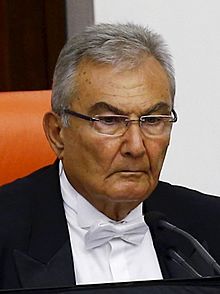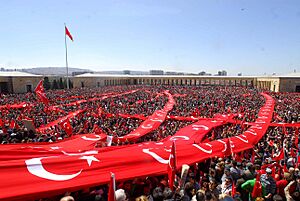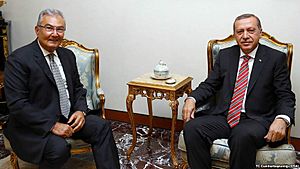Deniz Baykal facts for kids
Quick facts for kids
Deniz Baykal
|
|
|---|---|
 |
|
| Speaker of the Grand National Assembly Interim |
|
| In office 17 November 2015 – 22 November 2015 |
|
| President | Recep Tayyip Erdoğan |
| Preceded by | İsmet Yılmaz |
| Succeeded by | İsmail Kahraman |
| In office 23 June 2015 – 1 July 2015 |
|
| President | Recep Tayyip Erdoğan |
| Preceded by | Cemil Çiçek |
| Succeeded by | İsmet Yılmaz |
| Deputy Prime Minister of Turkey | |
| In office 31 October 1995 – 6 March 1996 |
|
| Prime Minister | Tansu Çiller |
| Preceded by | Necmettin Cevheri |
| Succeeded by | Nahit Menteşe |
| Leader of the Opposition | |
| In office 19 November 2002 – 22 May 2010 |
|
| Prime Minister | Recep Tayyip Erdoğan Abdullah Gül |
| Preceded by | Tansu Çiller |
| Succeeded by | Kemal Kılıçdaroğlu |
| Minister of Foreign Affairs | |
| In office 31 October 1995 – 6 March 1996 |
|
| Prime Minister | Tansu Çiller |
| Preceded by | Ali Coşkun Kırca |
| Succeeded by | Emre Gönensay |
| Vice President of Socialist International | |
| In office 31 October 2003 – 2 July 2008 |
|
| President | António Guterres George Papandreou |
| Country | Turkey |
| Preceded by | Erdal İnönü |
| Succeeded by | Kemal Kılıçdaroğlu |
| 4th Leader of the Republican People's Party | |
| In office 30 September 2000 – 10 May 2010 |
|
| Preceded by | Altan Öymen |
| Succeeded by | Kemal Kılıçdaroğlu |
| In office 9 September 1995 – 23 May 1999 |
|
| Preceded by | Hikmet Çetin |
| Succeeded by | Altan Öymen |
| In office 9 September 1992 – 18 February 1995 |
|
| Preceded by | Bülent Ecevit |
| Succeeded by | Hikmet Çetin |
| Minister of Energy and Natural Resources | |
| In office 5 January 1978 – 12 November 1979 |
|
| Prime Minister | Bülent Ecevit |
| Preceded by | Kamran İnan |
| Succeeded by | Ahmet Esat Kıratlıoğlu |
| Minister of Finance | |
| In office 26 January 1974 – 17 November 1974 |
|
| Prime Minister | Bülent Ecevit |
| Preceded by | Sadık Tekin Müftüoğlu |
| Succeeded by | Bedri Gürsoy |
| Member of the Grand National Assembly | |
| In office 14 November 2002- – 11 February 2023 |
|
| Constituency | Antalya (2002, 2007, 2011, June 2015, Nov 2015, 2018) |
| In office 14 December 1987 – 18 April 1999 |
|
| Constituency | Antalya (1987, 1991, 1995) |
| In office 14 October 1973 – 12 September 1980 |
|
| Constituency | Antalya (1973, 1977) |
| Personal details | |
| Born | 20 July 1938 Antalya, Turkey |
| Died | 11 February 2023 (aged 84) Ankara, Turkey |
| Political party | Republican People's Party (1956–1980, 1992–2023) Populist Party/Social Democracy Party (1983-1985) Social Democratic Populist Party (1985–1992) |
| Spouse | Olcay Baykal |
| Alma mater | University of Ankara University of California Columbia University |
Deniz Baykal (born July 20, 1938 – died February 11, 2023) was an important Turkish politician. He was a member of the Republican People's Party (CHP), which is one of Turkey's main political parties. Baykal held many high-ranking positions in the government. He was the Deputy Prime Minister and the Minister of Foreign Affairs from 1995 to 1996.
He also led the CHP party three times: from 1992 to 1995, from 1995 to 1999, and again from 2000 to 2010. When his party was the second largest in the Turkish Parliament, he served as the Leader of the Opposition from 2002 to 2010. This meant he was the main voice speaking against the government.
Baykal was first elected to Parliament in 1973. He served as the Minister of Finance in 1974 and as the Minister of Energy and Natural Resources from 1978 to 1979. After a military takeover in 1980, the CHP party was closed, and Baykal was briefly held. He returned to Parliament in 1987.
In 1992, Baykal helped bring back the CHP party. He led the party into a coalition government in 1995, where he became Deputy Prime Minister and Foreign Minister. After a tough election in 1999, his party lost all its seats, and he resigned. However, he was re-elected as leader in 2000 and led the party to better results in the 2002 election, becoming the Leader of the Opposition.
Because he was the oldest member of Parliament after the June 2015 election, Baykal briefly served as the temporary Speaker of the Grand National Assembly. He was also the CHP's candidate for the permanent Speaker role but did not win. He served as interim Speaker again after the November 2015 election.
Contents
Early Life and Education
Deniz Baykal was born in Antalya, Turkey. His parents were Hüseyin Hilmi and Feride. He went to the University of Ankara to study law.
He continued his studies in the United States. He attended the University of California, Berkeley and Columbia University. He was able to study there thanks to a special scholarship called the Rockefeller scholarship. By 1963, he earned his Ph.D. from the University of Ankara Faculty of Political Science. After his studies, he became an associate professor at the same university. He taught there until 1973.
Political Beginnings Before 1980
Getting Started in Politics
Baykal started his political journey in the 1950s. He joined student groups that were against the government of Adnan Menderes. He caught the attention of the CHP party leaders. This happened after he wrote a detailed study about why the party lost the 1965 election. This study later became part of his academic work.
In the 1973 general election, Baykal was elected as a Member of Parliament for Antalya. At that time, he was the youngest MP in the entire Parliament.
Serving as Finance Minister
In 1974, Baykal became the Minister of Finance. This was part of a short-term government led by Bülent Ecevit. This government was a partnership between the CHP and another party called the National Salvation Party. This partnership did not last long. The government ended in November 1974, so Baykal's time as Finance Minister was less than a year.
Minister of Energy and Natural Resources
From January 1978 to November 1979, Baykal served as the Minister of Energy and Natural Resources. He was part of the third government led by Bülent Ecevit. This government had a small majority in Parliament.
During his time as Energy Minister, Baykal also became a member of the CHP Party Council. He served on the Central Executive Committee and as a deputy Secretary General. After the 1979 elections, he openly criticized the party's leadership.
The 1980 Military Coup
In 1980, there was a military takeover in Turkey. Like many other politicians, Deniz Baykal was arrested and held in Ankara. The military banned him from political activities for five years.
In 1984, Baykal joined a new party called the Social Democracy Party (SODEP). In 1987, a public vote allowed politicians banned after the coup to return to politics. This meant Baykal, along with other key figures like Ecevit and Süleyman Demirel, could re-enter the political scene.
Political Career After 1980
The SHP Years
In 1987, SODEP joined with another party to form the Social Democratic Populist Party (SHP). Baykal was again elected as an MP for Antalya in the 1987 elections. In 1988, he became the General Secretary of the SHP. He also served as the party's leader in Parliament.
Baykal tried three times to become the leader of the SHP, but he did not win. He became a strong voice of opposition within the party. During this time, he also worked on Turkey's relationship with the European Union. He was a member of the parliamentary foreign policy committee.
Bringing Back the CHP
In 1992, laws that stopped old political parties from restarting were removed. Deniz Baykal led a big effort to bring back the historic Republican People's Party (CHP). This party had been closed down by the military in 1980. Baykal was then elected as the leader of the re-established CHP.
In 1995, the CHP officially joined with the SHP. Baykal did not run for leadership in this new, bigger CHP. Instead, Hikmet Çetin was chosen as the leader.
Working in Coalition Governments
Baykal was re-elected as the leader of the CHP in September 1995. He then formed a government with the True Path Party (DYP). The leader of the DYP, Tansu Çiller, became the Prime Minister. Baykal took on the roles of Deputy Prime Minister and Minister of Foreign Affairs.
One of his main conditions for joining the government was to hold an early election. This election happened in December 1995. The CHP finished fifth, with only 10.71% of the votes. The coalition government lost its majority in Parliament.
Despite the poor election result, Baykal was re-elected as CHP leader in 1998. However, in the 1999 general election, the CHP did not get enough votes (10%) to win any seats in Parliament. This meant all CHP MPs were out of the chamber. Baykal resigned as leader, and Altan Öymen took his place. But in 2000, Baykal ran for leader again and was elected for a third time.
Leader of the Opposition (2002-2010)


In the 2002 general election, Baykal led the CHP to second place, winning 19.38% of the votes. A new party, the Justice and Development Party (AKP), won a large majority. This ended many years of unstable governments. Baykal became the Leader of the Opposition because the CHP was the only other party in Parliament.
Baykal played a role in helping the AKP change a law. This change allowed the AKP's leader, Recep Tayyip Erdoğan, to enter Parliament. Erdoğan had been banned from public office. The CHP supported the change, and Erdoğan was elected to Parliament in 2003. He then became Prime Minister.
Baykal always believed in a strong response to terrorism.
In the 2004 local elections, the CHP gained more votes but lost control of Antalya, Baykal's hometown, to the AKP. Because of this, Mustafa Sarıgül challenged Baykal for the party leadership in 2005. Baykal won the election, but there was some conflict between supporters. Sarıgül was later removed from the party.
Baykal strongly opposed the AKP's choice of Abdullah Gül as their candidate for president in 2007. This was because of Gül's past in political Islam. The CHP held several Republic protests against this. CHP members of Parliament did not attend the presidential election process. Because a certain number of MPs needed to be present to elect a President, the AKP could not elect Gül without the CHP. This led to an early general election in July 2007.
For the 2007 general election, Baykal's party teamed up with another party. They slightly improved their vote share, but the CHP lost many seats. However, Gül was elected President this time. In 2009, Baykal criticized the start of a Kurdish language TV channel, saying it only focused on ethnic demands.
The CHP continued to increase its vote share in the 2009 local elections. They won back control of Antalya. The AKP lost some support, likely due to the global financial crisis that happened a year before. Even though Baykal led the CHP to more votes in every election since 2002, he never won an election outright.
He resigned from the leadership of CHP on May 10, 2010. This happened after a video about his private life was shared in the media. Many party members wanted him to return as leader. However, many local party leaders supported Kemal Kılıçdaroğlu instead. Baykal decided not to run again, and Kılıçdaroğlu was elected without opposition.
Political Activities Since 2010
Baykal was re-elected as an MP in the 2011 and June 2015 general elections. Since he was the oldest member of the new Parliament after the 2015 election, he became the temporary Parliament Speaker on June 23, 2015. He was the CHP's candidate for the permanent Speaker role but lost to Justice and Development Party candidate İsmet Yılmaz.
In August 2015, Baykal was offered a position as a minister by Ahmet Davutoğlu, the leader of the AKP. This was for a temporary government formed after coalition talks failed. The CHP was offered five ministries. However, the CHP decided not to join this temporary government. Baykal, along with four other CHP MPs, turned down the offer. His refusal letter was three pages long and he called it a "historical document."
After the November 2015 general election, Baykal was again the oldest MP. He became the interim Speaker of Parliament on November 17, 2015. He was later replaced by İsmail Kahraman, who was elected Speaker on November 22, 2015.
Personal Life and Death
Deniz Baykal passed away on February 11, 2023, at the age of 84. His wife, Olcay, found him in his bed around 5:00 AM. His daughter, Aslı Baykal, announced that he died from a heart attack.
Images for kids
See also
 In Spanish: Deniz Baykal para niños
In Spanish: Deniz Baykal para niños
 | William Lucy |
 | Charles Hayes |
 | Cleveland Robinson |




